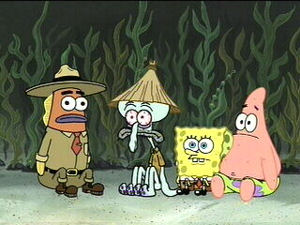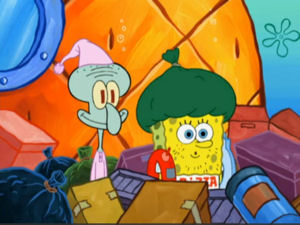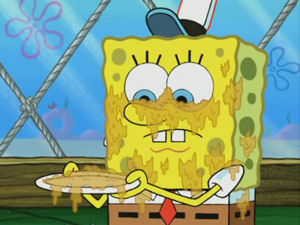In Defense of SpongeBob - Page 2
Nickelodeon's smash hit cartoon, SpongeBob SquarePants, made the news rounds yesterday because of a study that suggested it might reduce the attention spans of 4-year-olds. Though I could easily spend some time discussing the worthlessness of the study (it's small, preliminary, sloppy, uncontrolled, etc.), I would rather talk about the serious subject matter that occasionally creeps into the show. These deep messages could easily plant themselves into the subconscious minds of developing young brains, for better or for worse, and I think that's far more relevant than what the cartoon does to the short-term attention span of a 4-year-old. As the father of a toddler, I am exposed to a lot of SpongeBob's exploits these days, but I will admit that I have been watching the show for much longer than my son has been alive. Sometimes, an episode will have a pretty intense, heavy subtext, and it isn't always hidden. For example:
#4
"Club SpongeBob"
|  |
#4
"Club SpongeBob"
|  |
The episode: SpongeBob, Patrick, and Squidward wind up in the middle of the wilderness with no food or supplies, save a toy called the magic conch (basically the same thing as a Magic 8-Ball). SpongeBob and Patrick insist on seeking guidance from the toy, which tells them to do nothing, while Squidward tries to use his reason to survive. Squidward is exasperated, however, when food literally falls from the sky, rewarding SpongeBob and Patrick for their inaction. Squidward wants to eat, but when he asks the conch if he can, it continually says, "No." As he reaches the height of anger and desperation, a ranger appears, and Squidward is certain they have finally been saved. However, the ranger has a magic conch shell of his own, and like SpongeBob and Patrick, he does exactly what it tells him to do. When the toy then instructs them all to "do nothing," Squidward finally relents, exhaustedly sitting down and proclaiming, "All hail the magic conch."
The subtext: In Genesis 22, Abraham is instructed by God to take his only son, Isaac, to the top of a mountain and kill him as a sacrifice to the Lord. Abraham is saddened by this demand, but he does as God instructs. At the last possible moment, with the knife about to fall into Isaac's chest, God stops Abraham's hand. The story is one of many Biblical tales about the importance of faith, the importance of believing even when it seems insane to do so. As they say, God works in mysterious ways, so if he tells you to sit around and do nothing, even when your survival is at stake, you'd better do what He says.
The lesson: If you're a religious parent, this is a great episode for starting a conversation with your kids about the nature of faith, especially since it lacks the utter brutality of Biblical parables like the one featuring Abraham and Isaac. If you're a heathen, you can use this episode to teach your children how random coincidence can make believers out of anyone. Either way, it can be a powerful teaching tool.
#5
"Sentimental Sponge"
|  |
#5
"Sentimental Sponge"
|  |
The episode: SpongeBob engages in some Spring cleaning, but as he tries to throw away his trash, Patrick asks how SpongeBob can discard things with such sentimental value. SpongeBob gives it some thought and realizes that Patrick is right. He stops the garbage truck from disposing of his stuff, and then, at work, he starts collecting things like mayo, patty grease, and even sweat, all because they supposedly maintain sentimental value. His house quickly fills with junk, which spills out onto his lawn. Squidward, upset over the mess, calls the police. The police condemn SpongeBob's house, informing him that he can either throw away all his junk or he can evacuate his pineapple. Deeply upset about this ultimatum, SpongeBob eventually agrees to throw it all away, taking a picture of each item so that the sentimental value is not lost. In the end, Squidward is happy that SpongeBob's house and lawn are clean, but then discovers that his house is filled to the brim with SpongeBob's photographs.
The subtext: I don't think you can even call this a subtext, because "Sentimental Sponge" is basically just an animated episode of A&E's Hoarders.
The lesson: SpongeBob will help motivate your kid to clean his or her room.
#6
"Greasy Buffoons"
|  |
#6
"Greasy Buffoons"
|  |
The episode: Mr. Krabs dumps his used fry grease behind the Chum Bucket, where his rival, Plankton, discovers it. Plankton, noting how delicious the grease is, starts soaking his "Chum Patties" in it, which causes a boon for his business. When Mr. Krabs realizes what is happening, he starts selling "Deluxe Krabby Patties," which are made from Krabby Patties soaked in grease. In response, Plankton starts selling "Chummy Patties with Quadruple Grilled Goodness," followed by Mr. Krabs soaking hamburger buns in grease to make "Yummy Bunz." Plankton then starts selling burnt grease crumbs, which he calls "Crispity Crunchities," and Mr. Krabs eventually just starts serving grease on a paper plate, which he calls "Wow! Soup." Disturbed by these developments, SpongeBob calls in the health inspector, who arrives in a Hazmat suit and shuts down both restaurants until the grease is cleaned up.
The subtext: There are so many possible subtexts in this episode, I hardly know where to start. The wise folks over at SpongeBob SquarePants Wiki think it might be a parable about the deviousness of the fast food industry, but I think it goes much deeper than that. You could argue that this is a recreation of the Cold War arms race between the USA and the USSR, making it a cautionary tale about the dangers of nuclear proliferation, or you could argue that it is a microchosm of the arms race that is evolution, making it an episode that deals with the very nature of life itself. This is a special episode indeed, and it can go as deep as you want it to, until you find Leonardo DiCaprio duking it out with the projection of his dead wife. Yes, this is the episode you should point to when somebody tries to argue that there is nothing particularly profound about SpongeBob SquarePants.
The lesson: If we don't do something soon, the world will end with everyone obese and covered in grease. Michelle Obama would approve this message.
-e. magill 9/13/2011
|
|